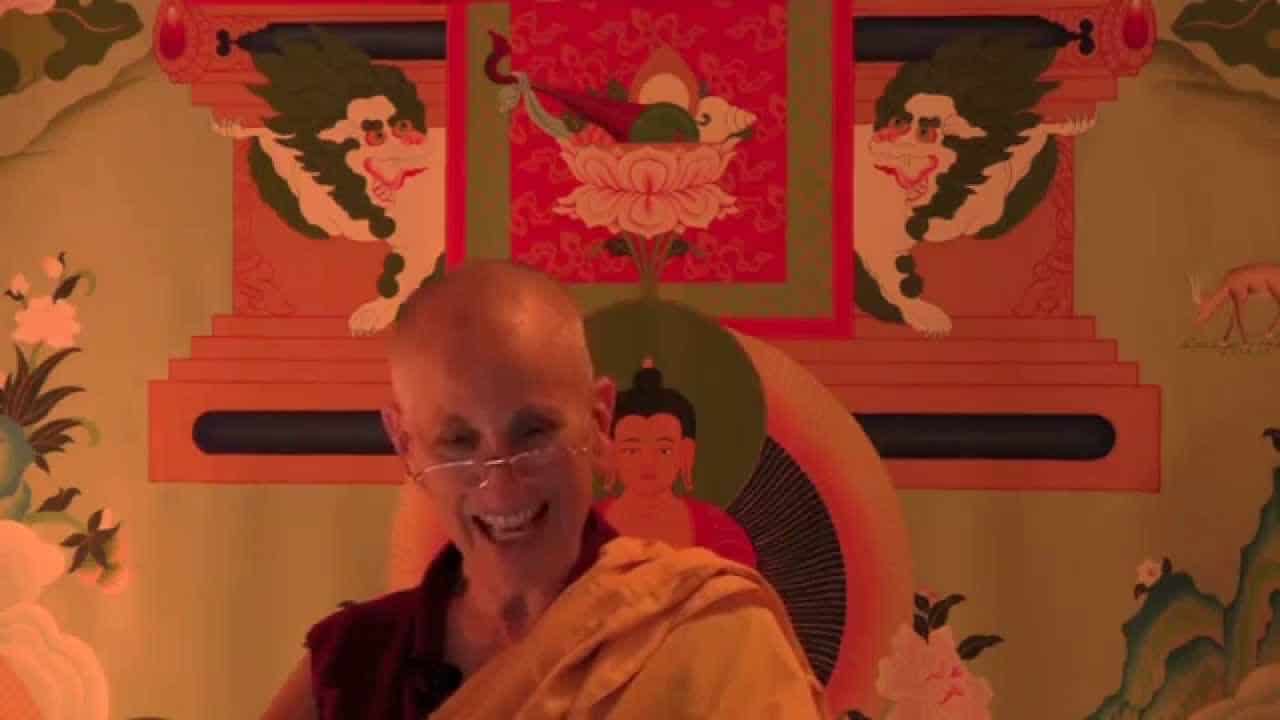Verse 63: The currency that eradicates all poverty
Part of a series of talks on Gems of Wisdom, a poem by the Seventh Dalai Lama.
- Three kinds of faith
- Faith grows over time
- Faith in Buddhism versus faith without investigation
- Faith supports the practice all along the path
Gems of Wisdom: Verse 63 (download)
What is the currency of which one coin can eradicate all types of poverty?
Spiritual faith. No one can steal it, and it dispels every mental confusion.
By “faith” he means confidence, trust. It doesn’t mean undiscriminating faith.
“What is the currency of which one coin can eradicate all types of poverty? Spiritual faith (or conviction). No one can steal it, and it dispels every mental confusion.”
Having trust and confidence in the path and in the teachers of the path, this is very important. If we don’t have trust, and confidence, and faith, then we’re not going to practice. Because we don’t go towards things that we don’t believe are true.
There are three kinds of faith, or confidence, trust.
- One is admiring faith or confidence, when we see the qualities of the Buddha, we see the qualities of a practitioner, and they really strike us as somebody remarkable and we say, “Wow, you mean people can be like that?” And we admire their qualities. That raises our energy, doesn’t it? It gives us a boost when we see people that we really admire. Because it’s just good to know that such people exist on the planet. And then also to know that it’s possible for us to become like that.
- And that leads to the second kind of faith or confidence, which is called aspiring faith or confidence where we aspire to become like a Buddha, or we aspire to become more generous, more ethical. We aspire to have more fortitude. Okay? So this kind of faith or confidence leads us towards something that is really noble.
The first one inspires our mind and give us a lot of energy. And the second one really leads us towards something that we can attain.
- And then the third one is convictional faith (or convictional confidence). And this is when we are really convinced of a teaching. So that comes about through really thinking about the teachings and seeing that they make sense, seeing that it’s possible to practice them, we can achieve the result. And then we have a real confidence that yes, this path works. And it’s trustworthy and I can engage in it and I can attain what one attains—liberation and full awakening—from practicing it.
That kind of faith (or confidence) with conviction comes from studying and contemplating something. Because we can’t have conviction in something unless we’ve studied it and know what it’s about. Otherwise, if we just hear the name or we just hear a few words here and a few words there, it doesn’t give us enough information, and it becomes actually unquestioning belief. And then it’s like, “Oh, well this is good because Buddha said it.” But that’s not a very good reason to believe something. You know, in Buddhism we want to believe things because we’ve thought about them and they make sense. Or because we’ve tried them and we see that they work.
It’s important to cultivate these three kinds of faith or confidence, because they’re a real help on the path. They’re the opposite to the mind of doubt, the mind of skepticism, the mind of cynicism, the mind that says, “Nyah, I don’t believe, you make me believe.” You know? Which isn’t a very sincere spiritual mind to start with.
Faith is really something that’s uplifting. And by having faith then it stimulates us to learn, and that way we generate wisdom. When we have wisdom then we have more reasons for believing the things that we believe in, and admiring the things we admire, and aspiring for the things we aspire. And so thus, our faith increases. So faith and wisdom are things that, on the Buddhist path, are very complimentary to each other. And they’re both very important. To see where we’re going, why we’re going there, and then to go about getting there.
[In response to audience] It’s a process, yes. Faith is not something that just comes [snaps fingers] like this. It’s not something that you can tell yourself, “Oh, I’ve got to believe. All my friends believe in this, I’d better believe it, too.” No. We have to really learn and think about things ourselves. And it’s something that develops over time.
But it is quite inspiring when we see people who have practiced for a long time—or we even take the example of the Buddha’s life, or His Holiness the Dalai Lama’s life—and then we see what they’ve gone through, how they’ve lived, how they’ve dealt with all sorts of things that have come up in their lives, and then that is very inspiring for us. We admire their qualities. We aspire to gain their qualities. And because they practice the Dharma, and that’s what’s given them the strength to deal with all of the things they’ve experienced in their lives, that actually makes us have more confidence in the Dharma—because here’s somebody who practiced it and they became like that.
So it’s good to look at what the goals are. Or look at the example of somebody who has practiced whatever we’re trying to become—or whatever path we’re following—because we’ll become like that person.
[In response to audience] When you’re practicing concentration, faith or confidence is an antidote to some of the hindrances to concentration. For example, laziness. “How is faith an antidote to laziness?” Well, laziness says, “I’m unqualified. The path is too hard. The goal is too difficult. I can’t do this.” So it’s the laziness of discouragement. Or we say, “You know, there are all these instructions, but I don’t know if you can really develop concentration by following them.” So there’s a lot of doubt in the mind. Whereas when we have faith in the instructions; when we have some confidence in ourselves, in the teachings, in the goal; then we overcome that kind of laziness. Because we see that it’s possible to attain those things, that there are other people who have done it, and we’re not inherently different from them. And if we just put out energy in that direction then we can make progress. Whereas laziness, we shoot ourselves in the foot before we’ve even taken a step, and then say, “Well, I can’t walk.” And we should definitely avoid doing that.
On the other hand, we should avoid being over-inflated with ourselves, thinking that we can accomplish anything by pure will and we don’t need a teacher and we don’t need the foundation practices, or anything like that. That’s not confidence, that’s arrogance.
[In response to audience] You’re saying, the kind of faith you were raised on as a kid was in some kind of external monolithic entity, and you just had faith in that. So your faith had to be towards one thing and it was very circumscribed, and that was it. Whereas, the kind of faith in Buddhism…. We have faith in a practice that we can actually do and try out. So it’s a bit different from having faith in something that’s already there, versus faith in a practice, and faith in yourself, so that you can do that practice and attain the result.
[In response to audience] Okay, when we look at the seven kinds of cognizers, we start out with wrong views, then we go to deluded doubt, then to correct assumption, then to inference, then to direct perception; that faith plays a role in that progress from having wrong views to having direct perception of reality. And so faith is a supporting factor in your practice that inspires your mind and keeps you going. So it’s not faith without investigation.
Venerable Thubten Chodron
Venerable Chodron emphasizes the practical application of Buddha’s teachings in our daily lives and is especially skilled at explaining them in ways easily understood and practiced by Westerners. She is well known for her warm, humorous, and lucid teachings. She was ordained as a Buddhist nun in 1977 by Kyabje Ling Rinpoche in Dharamsala, India, and in 1986 she received bhikshuni (full) ordination in Taiwan. Read her full bio.


